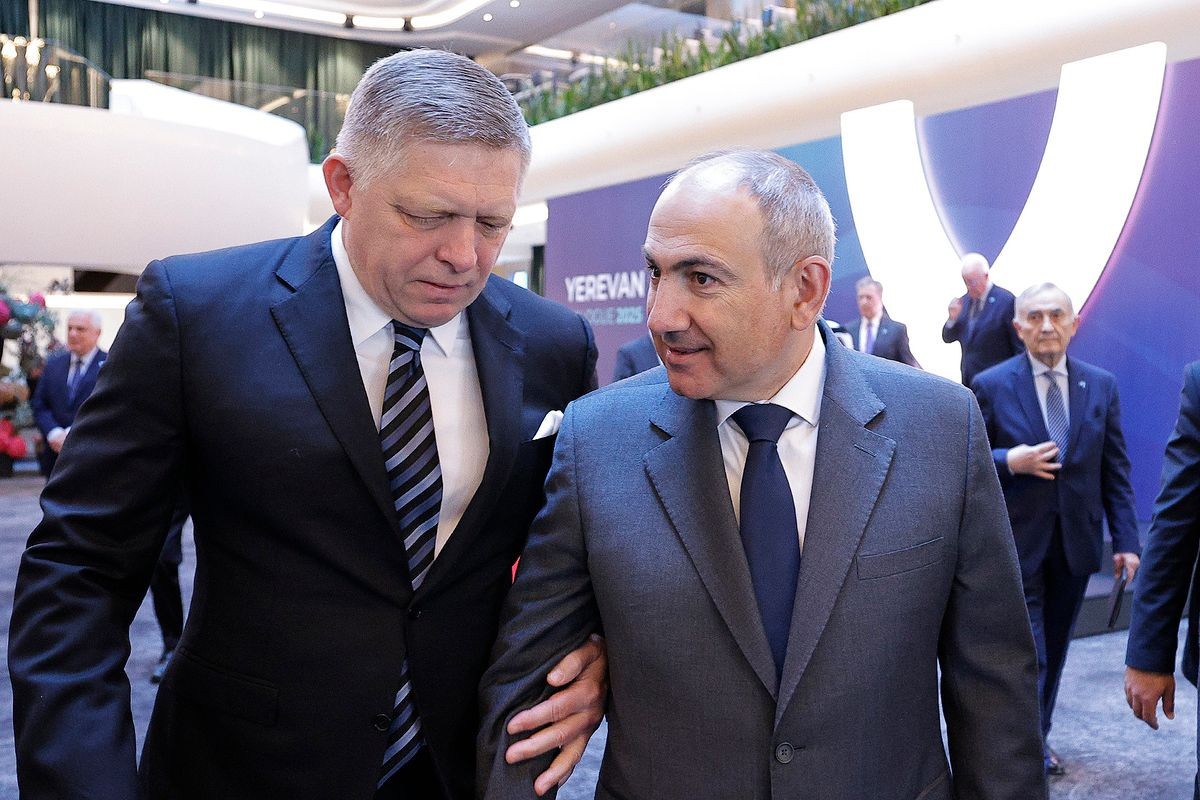
Armenian Prime Minister Nikol Pashinyan has met with his Slovak counterpart Robert Fico, during which they discussed possible cooperation in the nuclear and defence sectors.
Pashinyan and Fico met on Monday.
According to a readout by Pashinyan’s office, the two discussed issues ‘related to the development of bilateral trade and economic relations, the expansion of business ties, and cooperation in the fields of industry, agriculture, and energy’.
During a subsequent press briefing, Pashinyan said that such high-level mutual visits ‘breathe new life into the political dialogue’ between the two countries, adding that he had accepted Fico’s invitation to visit Slovakia.

Describing the bilateral agenda as ‘very broad’, Pashinyan said that, at the suggestion of Fico, they had agreed to ‘take several leading directions’, including cooperation in the field of nuclear energy. They also discussed potential collaboration in the military-industrial sector, where, according to Pashinyan, they see ‘certain opportunities’.
‘I hope and am sure that as a result of this visit, we will have concrete agendas and projects in all these directions’, Pashinyan said.
In turn, Fico noted that Armenia and Slovakia operate the same type of nuclear reactors and suggested establishing ‘a wonderful cooperation through the joint efforts’ of the two countries’ specialised companies.
As for defence cooperation, Fico said ‘if we do not produce weapons, someone else will, and we will have to buy them’.
‘If we have to spend a lot of money on our defence, then let’s do what we can, as small countries, find products that will meet our needs, and at the same time, this cooperation will allow us not to buy from other large partners, from the North Atlantic Alliance’, Fico said.
During the talks, Pashinyan also reiterated Armenia’s ‘strategic decision’ to remain committed to the peace agenda, adding that consultations with Azerbaijan were ongoing ‘so that this historic opportunity is not missed’.
Fico arrived in Yerevan to participate in the second annual Yerevan Dialogue Forum held from 26–27 May, an international conference featuring high-ranking officials from several countries, as well as policymakers, academics, and civil society representatives. The theme of the 2025 forum, organised by Armenia’s Foreign Ministry, was ‘Navigating the Unknown’.
‘Strategic’ Armenia–France relations
French Foreign Minister Jean-Noël Barrot also visited Yerevan in order to participate in the international forum.
While there, together with his Armenian counterpart Ararat Mirzoyan, Barrot signed three documents, including a Declaration of Intent on holding annual political consultations, cooperation in combating disinformation, and training diplomats.
During a separate meeting with Pashinyan, Barrot, according to a readout by Pashinyan’s office, noted that France was ready to further deepen and expand relations with Armenia, including in the political and economic spheres.
Barrot also emphasised France’s ‘unwavering support for Armenia’s development and capacity-building’.
At a joint press briefing with Mirzoyan, Barrot stated that his visit to Armenia ‘reaffirm[s] France’s support, which, according to President [Emmanuel] Macron, must be stable, comprehensive, and unwavering’.
In turn, Mirzoyan stated that he and Barrot discussed ‘the rich bilateral agenda [...] and the mosaic we have jointly shaped, which provides the basis for assessing our relations as strategic’.
The two states currently cooperate in areas that ‘just a few years ago could not even have been discussed’, Mirzoyan said, apparently referring to their defence cooperation.

During a panel discussion at the forum, Barrot emphasised that peace in the South Caucasus, which he described as ‘a key region connecting the European Union with the East’, could serve as the foundation for building ‘a prosperous future and regional integration, benefiting both Armenia and the EU’.
He additionally noted that France calls on both Armenia and Azerbaijan to sign and ratify the peace treaty.
Earlier, in his opening remarks of the forum, Mirzoyan said that Armenia’s vision is the normalisation of relations with Azerbaijan and Turkey, as well as remaining ‘steadfast in strengthening its partnerships also beyond the region’.









